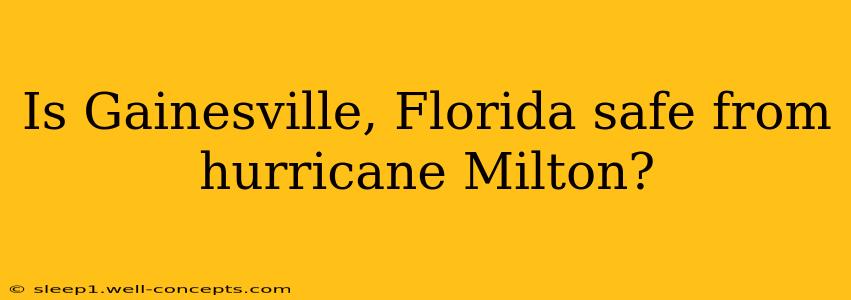Gainesville, Florida, sits inland, offering a degree of protection from the direct impacts of hurricanes compared to coastal cities. However, assuming complete safety from a hurricane like a hypothetical "Hurricane Milton" would be inaccurate. While the city is less likely to experience the devastating effects of storm surge and high winds directly, it remains vulnerable to various hurricane-related hazards. This article will explore Gainesville's risk profile, examining the threats posed by a significant hurricane and what precautions residents should take.
Understanding Gainesville's Geographic Vulnerability
Gainesville's inland location, approximately 70 miles from the Gulf Coast, significantly reduces the risk of direct storm surge damage. The powerful waves and flooding associated with hurricanes are largely confined to coastal areas. However, this doesn't eliminate all risks.
Potential Hazards for Gainesville During a Hurricane:
-
Heavy Rainfall and Flooding: Hurricanes frequently bring torrential rainfall, even to inland areas. Gainesville could experience significant flooding from prolonged downpours, leading to overwhelmed drainage systems, road closures, and potential damage to homes and businesses. The Santa Fe River and numerous smaller waterways within the city could overflow, causing widespread inundation.
-
Strong Winds: While the strongest winds will typically be felt closer to the coast, Gainesville can still experience damaging winds from a major hurricane. High winds can down trees and power lines, leading to power outages and property damage.
-
Tornadoes: Hurricanes can spawn tornadoes, particularly in the outer rainbands. Although the probability is lower than in coastal areas, Gainesville isn't immune to this significant threat.
-
Debris: Even if the storm's center passes well offshore, powerful winds can carry debris significant distances. Flying debris is a major cause of damage in hurricanes, regardless of location.
Hurricane Preparedness for Gainesville Residents
Regardless of Gainesville's inland position, proactive hurricane preparedness is crucial. Residents should:
-
Develop a Hurricane Plan: This plan should include evacuation routes (knowing when and where to evacuate is essential), communication strategies with family and friends, and a well-stocked emergency kit.
-
Build an Emergency Kit: This kit should contain essential supplies such as water, non-perishable food, medications, flashlights, batteries, first-aid supplies, and a battery-powered radio.
-
Secure Your Property: Before a hurricane approaches, bring loose outdoor furniture inside, trim trees and shrubs that could fall, and board up windows if necessary.
-
Stay Informed: Monitor weather reports closely and heed any warnings or evacuation orders issued by local authorities. Multiple news sources and the National Hurricane Center website are vital resources.
-
Understand Your Flood Risk: Even though Gainesville isn't directly on the coast, understanding your specific flood risk, whether from rivers or heavy rainfall, is crucial. Knowing your flood zone designation can help in making informed preparations.
Conclusion: Safety is a Proactive Choice
While Gainesville is less susceptible to the direct impacts of hurricanes than coastal communities, it's essential to understand and prepare for the various threats a major storm can bring. Active preparation and a well-defined hurricane plan are critical steps to mitigating risks and ensuring the safety of Gainesville residents during hurricane season. The hypothetical "Hurricane Milton" serves as a reminder that complacency is dangerous; proactive planning is the best defense against hurricane-related hazards in any location.

